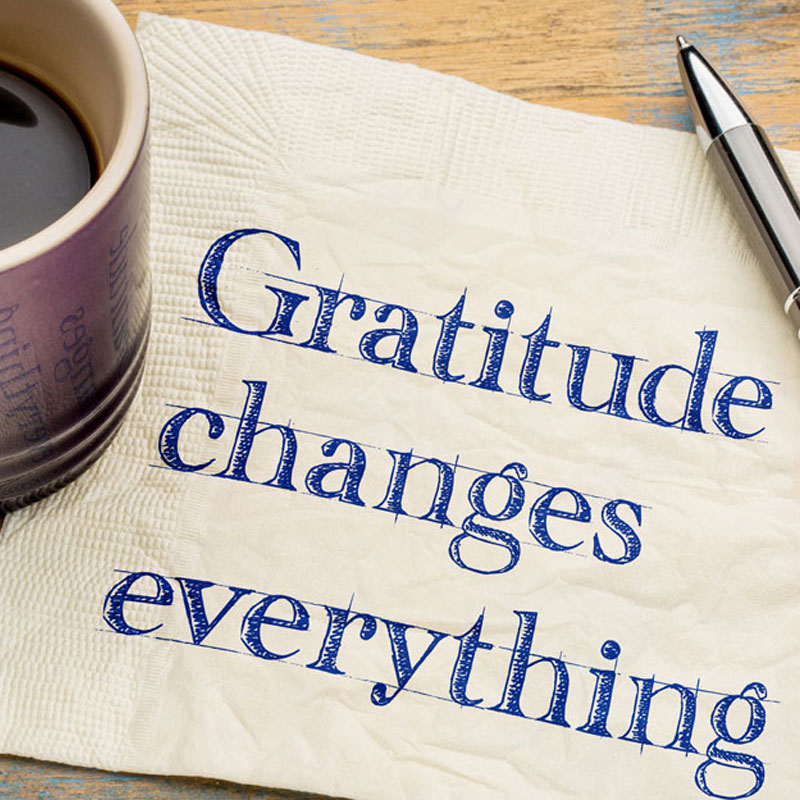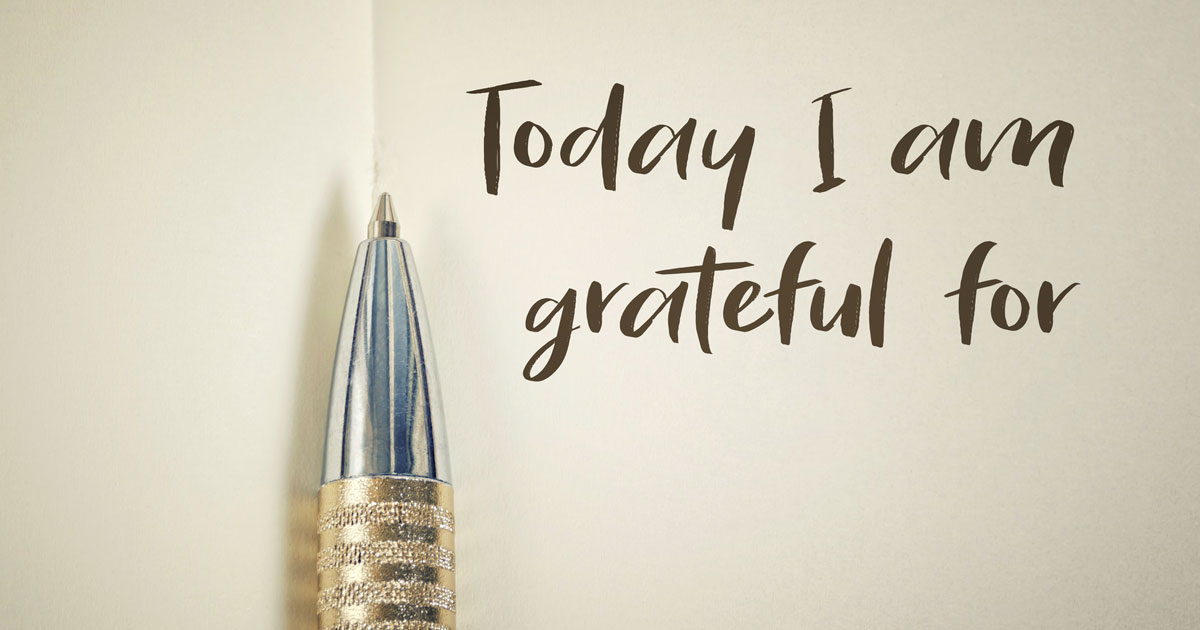
Overcoming addiction is an ongoing process, and the work to stay free of substance abuse never truly stops. One of the reasons people backslide is the sheer frustration of how long recovery takes. The easy thing to do is become bitter and disenchanted with recovery and return to the old comfort zone of indulging addiction. Understanding the benefits of showing gratitude in recovery can help you adopt a grateful attitude that fosters an important sense of positivity.[1]Chen, G. (2017). Does gratitude promote recovery from substance misuse?. Addiction Research & Theory, 25 (2), 121-128.https://doi.org/10.1080/16066359.2016.1212337
Gratitude in recovery comes more naturally to some people than others. If gratitude doesn’t come easily during your recovery, there are practices you can follow to retrain your mind toward this more positive outlook.
A Sense of Gratitude Can Help Through Tough Times
Arriving at a point in life where you are making a sincere effort to recover takes time. It probably involved hitting several low points and tough times along the way, and those pitfalls still occur after recovery begins. Sometimes the effort involved in recovery can make the struggles of a tough time feel even worse. It can feel like a setback to the progress you are making. Gratitude can help keep your focus on the progress, not the setback.
Many great thinkers and philosophers have applied definitions to gratitude. [2]Gulliford, L., Morgan, B., & Kristjánsson, K. (2013). Recent work on the concept of gratitude in philosophy and psychology. The Journal of Value Inquiry,47 (3), … Continue reading What they lead back to is thankfulness for what you have and where you are in life. If you are in recovery, you have people rooting for you to overcome your addiction. You have the promise of improving health. Keeping your focus on these and other positives in your life can help you develop thankfulness. Maintaining a grateful mindset during tough times can also help you remember that they do pass. Staying grateful during both good and bad times keeps your mindset in a consistent place.
Gratitude Can Promote Positivity

When you’re mired in the depths of addiction, other negative situations often come along with it. Substance abuse strains relationships, impacts personal finances, and can stymie your career, among other potential barriers to happiness.
Sometimes addiction can even lead to imagined negative situations, like believing friends and family who just want to help are against you. This self-centered thought process is the opposite of gratitude, which would help you see your loved ones are trying to show they care and want to help.
Negative thinking can become so pervasive that it begins to impact all parts of your life. These dark and clouded thoughts can take a negative situation and make it worse.
Some of the negative thought processes that overwhelm the brain when gratitude isn’t present include:
- All-or-nothing thinking
- Catastrophizing
- Overgeneralizing
- Mental Filtering
- Discounting positive experiences
Learning about the forms of negative thinking can prepare you to combat them with a dose of gratitude.
Why Gratitude?
Grateful people exude qualities that help keep addiction in check.
Some of those traits include:
- Optimistic outlook
- Better equipped to deal with challenges
- Feeling energized
- A sense of control in life
- Clear thinking
- Less propensity to fret and feel stressed
Gratitude is the key to finding the silver lining in a negative situation, and the thoughtful optimism and clarity that gratitude brings help keep the situation in perspective. Appreciating simple things that are going well or being thankful for small acts of kindness by others can lift your spirits while the negative situation is resolved.
The affliction of addiction is a negative situation itself. The quicker you can assume a position of feeling gratitude for being sober, the more likely your recovery will be successful and make a lasting impact on your ability to maintain sobriety. Those who view recovery as a burden or see their recovery experience as negative are more likely to turn back to alcohol or drugs. Resentment and bitterness are the enemies of recovery. Gratitude inspires the mind and the body to turn away from substance abuse.
Gratitude Is Contagious

Reprogramming an addicted brain is a learned behavior. The same can be said for thinking with gratitude. If you’ve spent months or years soured by a negative outlook, it isn’t easy to swap rose-colored glasses with your current position of seeing everything as gray and stormy. The good news is that gratitude is contagious, and you can practice gratitude with others to help teach yourself to find positivity naturally.
When you communicate with other people, express what you are thankful for. If you accomplished something at work, don’t be afraid to pat yourself on the back and let people know how happy it made you. When others share their successes, listen, and let their gratitude rub off on you too.
Gratitude for even the smallest courtesies can promote a consistent sense of thankfulness. If someone holds the door for you or lets you merge into traffic on a busy road, make a conscious effort to be grateful. Once you’ve been able to adjust to this mindset of gratitude as your default, negativity will creep into your mind far less often, even when negative circumstances arise.
Gratitude Can Help You Alleviate Self-Blame
Another way to practice gratitude is to shift the tone of your conversations to eliminate self-blame. Instead of responding to questions with “I’m sorry,” or worse, using “I’m sorry” as a greeting, like “I’m sorry I’m late,” or “I’m sorry for taking so long to email you,” say “thank you” instead.
Examples might be:
- Thank you for your patience.
- Thank you for your willingness to reschedule
- Thank you for waiting for me
Conditioning your mind to be thankful instead of sorry is a sure sign your attitude of gratitude is improving.
Gratitude Can Help Reduce Feelings of Entitlement and Increase Appreciation
Entitlement is a toxic, negative mindset, and is a way of thinking most people aren’t even aware they are portraying. [3]Wetzel, H. A., Hammerschmidt, M., & Zablah, A. R. (2014). Gratitude versus entitlement: A dual process model of the profitability implications of customer prioritization.Journal of Marketing, 78 … Continue reading Entitlement is born of convenience. It leads to the belief that a good thing that happened before should continue to happen in perpetuity and leads to a bitter soul when that convenience is absent.
This is where showing appreciation for even small gestures of kindness or relatively minuscule positive occurrences comes into play. Practicing gratitude by thanking someone who lets you cut in line in the supermarket because you only have one item is an appropriate way of showing gratitude and ingraining it into your own practices. If you started to expect such a favor all the time, however, your entitlement could lead to refusal and then hostile thinking.
Entitlement is bred out of convenience that you fail to appreciate and start to expect instead. Gratitude should be consciously employed to battle the lack of appreciation.

To go a step further to tie entitlement to addiction, entitlement can be caused by the convenience of being able to use a substance to get a certain effect. After a while, as the addiction takes hold, so does a sense of entitlement to the feeling of getting drunk or high. There is no longer an appreciation for the benefits of sobriety or the loved ones who may be hurt by your addiction. Gratitude can help reverse these feelings on the path to recovery.
Gratitude Promotes Self-Esteem
People suffering from addiction are their own worst enemies when it comes to recovery. Embarrassment and frustration are self-defeating emotions many people encounter when trying to become sober. Gratitude can raise an individual’s self-esteem and help them realize they aren’t a bad person solely because of substance abuse. [4]Lin, C. C. (2015). Gratitude and depression in young adults: The mediating role of self-esteem and well-being. Personality and Individual Differences, 87, 30-34. … Continue reading
Having a sense of gratitude replaces embarrassment and frustration with thankfulness. A grateful person isn’t ashamed to thank a friend for checking in on them. Instead of being frustrated over cravings and withdrawal symptoms, gratitude leads to a thankfulness for being able to overcome without indulgence in drugs or alcohol.
Gratitude Helps You Focus on What Really Matters
A successful recovery requires the patient to remain motivated. There are many sources of inspiration one can draw on when recovering from substance abuse, and gratitude is the key that unlocks them. Inspiration and motivation work together to support a focus on recovery.
Gratitude helps promote the focus on channeling inspiration and motivation into sobriety. Negative thinkers are more prone to lose their will and relapse. However, someone who practices gratitude can appreciate the benefits sober living will have in their life and be better able to maintain sobriety.
Understanding the positives that sobriety brings and equally recognizing the harm substance abuse causes in all aspects of life are traits strengthened by gratitude. A grateful person knows sobriety is essential to healing the harm caused by addiction to themselves and to others.
Committing Your Gratitude to Writing

If you’re not able to practice gratitude in social settings or in your communication with people, practice gratitude introspectively by journaling or creating a gratitude list. Gratitude lists are a helpful tool for people battling addiction, depression, and other afflictions that impact the inclination and willingness to experience gratitude.
A gratitude list is a short list of things you are grateful for in your life. It doesn’t have to be exhaustive or written all in one sitting. Many people have benefited from spreading out their gratitude list throughout the day. For example, when you wake up each morning, write down five things you are grateful to be looking forward to that day. In the evening, write down five things that happened that you are grateful for. By committing your gratitude to writing, you are conditioning your mind to expect positive outcomes and good feelings, even when times are challenging
Reviewed by Christopher Schwartfigure MS, LGPC, CAC-AD
References
| ↑1 | Chen, G. (2017). Does gratitude promote recovery from substance misuse?. Addiction Research & Theory, 25 (2), 121-128.https://doi.org/10.1080/16066359.2016.1212337 |
|---|---|
| ↑2 | Gulliford, L., Morgan, B., & Kristjánsson, K. (2013). Recent work on the concept of gratitude in philosophy and psychology. The Journal of Value Inquiry,47 (3), 285-317.https://doi.org/10.1007/s10790-013-9387-8 |
| ↑3 | Wetzel, H. A., Hammerschmidt, M., & Zablah, A. R. (2014). Gratitude versus entitlement: A dual process model of the profitability implications of customer prioritization.Journal of Marketing, 78 (2), 1-19.https://doi.org/10.1509/jm.12.0167 |
| ↑4 | Lin, C. C. (2015). Gratitude and depression in young adults: The mediating role of self-esteem and well-being. Personality and Individual Differences, 87, 30-34. https://doi.org/10.1016/j.paid.2015.07.017 |








